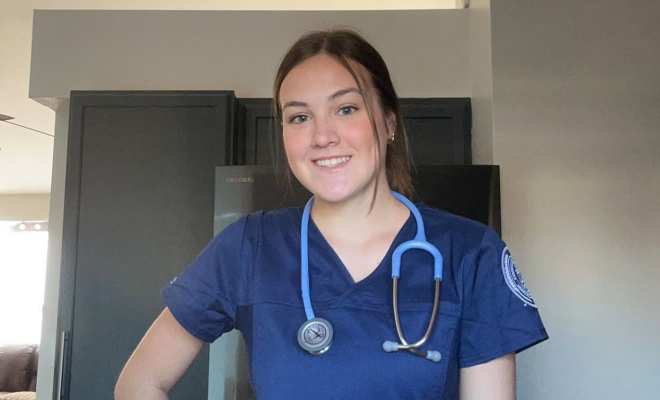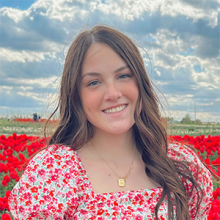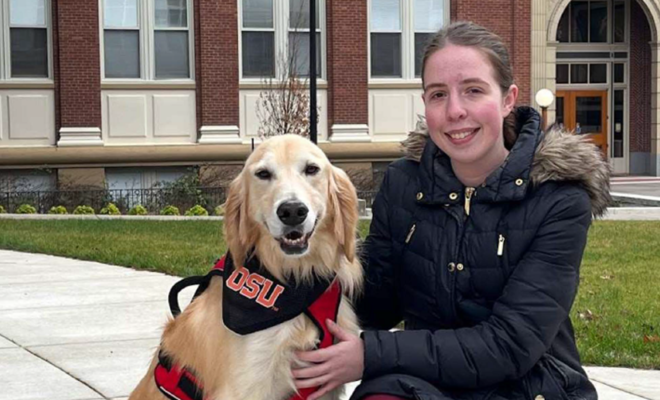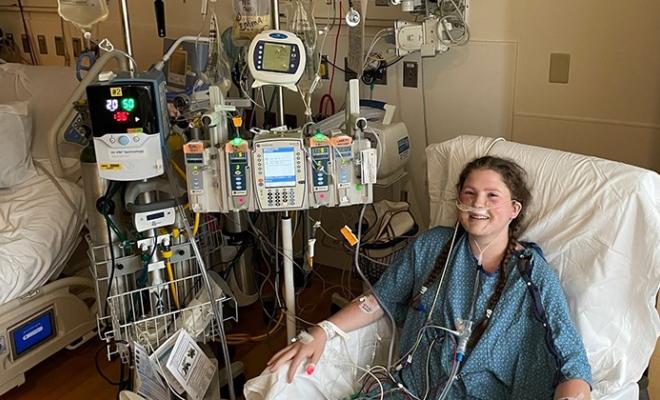“Okay, sit still,” I say as I am taking a leftover PICC line dressing and placing it on my little sister’s arm while she’s lying on the kitchen table. As a kid with cystic fibrosis, you pick up on the little things that nurses do for you, like changing dressings, giving medications, priming a feeding tube, and starting your IV pump. That was 10 years ago. Now, I am doing all these things for other people.
From a young age, the medical field had the largest impact on my life (as it did for most of us with CF). I guess it made sense that I felt this was where I was supposed to be. At first, I wasn’t sure which path to take before Trikafta® came about. I wasn’t sure if building a long-standing career would be in the cards for me anyway. I looked into becoming a chiropractor, a pediatrician, and even a veterinarian. I always said I didn’t want to become a nurse, but something kept drawing me to it. So, during my junior year of high school, I did some research into nursing. I realized there are so many job options within the nursing field, which made me more interested. I started taking college credit classes, and before I knew it I had graduated high school, finished my all my prerequisites, and was accepted into nursing school.
Managing nursing school and my health has been one of the hardest challenges I have ever taken on. Nursing school is difficult on its own, but adding a chronic lung disease on top of it doesn’t make it any easier. I had amazing results after I first started Trikafta, and my lungs continued to respond well to the medication. Sometimes I would forget that I had CF, and it was nice to forget. During my first year of college, I tried to do everything my roommates were doing — and often ended up sick. Living in the dorms probably didn’t help. But at the time, my lungs were still keeping up for the most part.
My second year began (first semester of nursing school), and school became way more stressful. I spent many late nights studying and doing homework, tried to have fun as any college kid does, struggled to find time for my health, and found myself sick again. But this time, I was sick for a few months instead of a few weeks. Instead of enjoying my holiday break, I spent it in the hospital, and then at home doing IV antibiotics. It was so frustrating, but I knew that I could have prevented this.
Adulting with CF is like trial and error. You are young so you make mistakes and sometimes they backfire on your health. But you learn, you grow, and make changes to keep your lungs in check. My parents have always said mistakes are “a learning experience.” I hated this phrase for the longest time (and still do a little bit). Nevertheless, I find myself realizing that I have had a lot of “learning experiences.” These experiences have allowed me to grow to become the person I am now. They have also influenced my career choice and helped me become the nurse that I want to be.
During my first semester of nursing school, I had a professor give a presentation about cystic fibrosis, but the content was outdated. I emailed my professor to ask where she had accessed her information because new medical advances had been made. She responded, “call me.” She and I had a great conversation about my experience and the recent breakthroughs with Trikafta. She asked me to present to the pathophysiology class about CF and all that it entails from my perspective.
I enjoy presenting about CF because it allows me to not only advocate for myself and the CF community, but also for future nurses entering the field. I realized that I was not only going to impact my patients, but I was going to impact my colleagues as well.
From my own experience as a patient, I’ve had nurses who are disorganized, inconsiderate, and look at you as only a patient, not a person. On the other hand, I have had nurses who listen to your concerns, care about you and what you have to say, and make the most out of your difficult situation. During my previous “learning experience” in the hospital, one of my nurses was the first kind. It made me so mad because I felt like she was just getting her tasks done and not actually listening to me. During this encounter, it seemed as though this nurse was not in this position to help others, but rather she was in it only for her own benefit. From that moment on, I knew I would never make my patients feel the way she made me feel. I want to be the nurse that makes you feel comfortable when you are uncomfortable, that listens when you are afraid, that advocates for you when you don’t have a voice, and that provides hope when everything may seem hopeless.
Individuals with chronic illnesses understand the patient perspective. If it wasn’t for the fear of getting exposed to illnesses while providing patient care, more of us would probably love to help in this way. But, not all of us can. I hope that I can do my part as a nurse and advocate for my patients because I understand their situation and know that I would want the same.
Interested in sharing your story? The CF Community Blog wants to hear from you.





